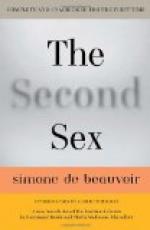|
This section contains 2,825 words (approx. 10 pages at 300 words per page) |

|
While all the ambivalences in [Simone de Beauvoir's] work may not be attributable to Sartre, so much of her argument is based on Sartrean concepts, so many of the very words and metaphors—particularly those describing female sexuality and existence—she chooses recall his, that it is impossible not to sense his influence throughout The Second Sex. After all, no one, least of all de Beauvoir herself, would deny that what could be considered the central concept of The Second Sex—the idea that woman is seen as the "other" both by individual men and by society as a whole—comes from the Sartrean dialectic enounced in Being and Nothingness. According to Sartre, the individual ego, in perpetual conflict with other egos or consciousnesses, seeks to assert itself precisely by subduing these other egos. In The Second Sex this essential process is described thus: "We find in consciousness...
|
This section contains 2,825 words (approx. 10 pages at 300 words per page) |

|


